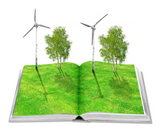
Recommended Eco-Friendly Living Books
There are two things that I’m passionate about; Wellbeing - taking time for self-care and for appreciating the wonder of the simple things in life and living sustainably and doing all possible to protect the planet. These two passions can both fuel one another and conflict with one another. Sometimes our wellbeing can be hampered by the overwhelming struggle we face now to tackle climate change. Though most of us want to play our part and reduce our carbon footprint, the more we learn the more depressing it can seem. The most practical thing to do to overcome this feeling is, well, something. Even if it’s just small changes to make life more sustainable at least in our homes.
That’s why I’ve put together my best recommended eco-friendly living books. In building this list I’ve taken special care to ensure that none are too overwhelming. I’m not sure, for instance, we need to know the carbon footprint of everything in the world. The list also does not comprise any books that are

judgemental because we’ve all grown up in a world where it’s taken a long time for us to realise the full impact we have on the environment and it does no one any good to be made to feel guilt over that. Mostly, we are hard-working, busy people, tending to and caring for those around us and trying to get ourselves and our loved ones through each day in one piece. So, if you’re trying to do that in a sustainable way too then you don’t need a lecture, you need a helping hand. The books for eco-friendly living that I recommend are positive, simple to follow and constructive.
I hope you find a book here that helps to make the path to eco-friendly living a little easier.
How To Break Up With Fast Fashion, by Lauren Bravo
What Bravo really understands is that living sustainably isn’t just about learning new habits. Or about simply quitting old habits. Lauren Bravo does not dismiss or play down the relationship we have with our clothing and with fashion. Recognising that we have a problem is the first step to recovery and that’s why How To Break Up With Fast Fashion reads like a self-help book.
Bravo approaches the truth about fast fashion with compassion and understanding, having been a life-long lover of bursting closets herself she knows that change does not come easy and changing our behaviours means first changing our mindset.
Fast fashion is probably one of the biggest threats to sustainable living. With a larger carbon footprint than air travel and shipping combined, clothes manufacturing can also pollute our waters and pile up in landfills with many manmade fibres never properly decomposing. Whilst many environmental changes need to be made at the government level and rely on business and science finding solutions, fixing the clothing crisis is largely in the hands of the consumer. Let’s face it, the fashion industry does not have a reputation for being the most ethical sector. Generally, this means that change does not happen unless consumers change their habits. But it’s not easy. Lauren Bravo’s How To Break Up With Fast Fashion is a guide to building a more sustainable wardrobe. Yet, rather than setting strict rules and restrictions, it holds your hand through the process and helps you move into your bright new future free from the compulsion to shop new so much.
Clean & Green: 101 Hints And Tips For A More Eco-Friendly Home, By Nancy Birtwhistle
Packed full of hints, tips and recipes for eco-friendly household cleaning products, this book is so much more than it first appears. Yes, the focus is on your cleaning routine which may seem a little niche, yet this book makes you realise how much the household products you use can impact the

environment. Then, most importantly, it teaches you how to solve the problem. Providing homemade low-cost solutions for cleaning your home with non-toxic eco-friendly cleaners, Nancy Birtwhistle proves you don’t need harsh chemicals to have a sparkling clean home. She even has an eco-friendly oven cleaner solution!
It’s not just cleaning either. Birtwhistle shares her tips and hacks for gardening, organisation, baking and everything around the house. If you’re looking to make sustainable changes in your home, this is the simple quick-fire guide you need. Buy it second-hand here.
Rewild Your Garden, by Frances Tophill
Sometimes I think our distance from nature is what has led us, humankind, to feel removed from it. Getting back to nature makes sustainable living feel more important. It also makes us feel better. Spending time outdoors has a positive impact on our wellbeing. Therefore, gardening is good for us and, it can be really good for the planet. Especially if we go down the rewilding route.
Frances Tophill is a renowned horticulturist who is passionate about rewilding the planet, starting in your back garden. Her beautiful book, Rewild You Garden, expertly explains why rewilding is so important and the value it can add to your outdoor space, as well as practical advice on how to do it. Making your garden a haven for wildflowers and wildlife is not just about giving nature an opportunity to thrive. Learning to do this can also help us discover the art of letting go. To resist the urge to control our surroundings and to trust that mother nature knows best. And this is a great book to guide you through that journey.
The Sustainable(ish) Living Guide, By Jen Gale
The Sustainable(ish) Living Guide helps those who are not ‘natural tree-huggers’ (as Gale claims she isn’t) to discover a new normal in adopting a more eco-friendly lifestyle. Experimenting by undertaking a year’s commitment to buy nothing new, Gale began her sustainable lifestyle journey by throwing herself into the deep end, which was hard for her but makes her the perfect person to assist us in doing it in a more gradual way. She knows the near-impossible changes and the ones that seem so but are ultimately far easier than we might have thought.
Whilst balancing the difficulty of reducing your carbon footprint, Jen Gale does not shy away from the importance of doing so. She urges us to embrace the ‘ish’ and not feel bad about not being perfect. What is important is doing what we can. Becoming part of a movement and bringing others along with us to make the big impact we need as a global society.
As books for eco-friendly living go, there’s a great amount of constructive advice here but also regular reminders of why we are doing so. With every commitment we make to change the way we live, our energy and positivity can falter along the way but Gale keeps bringing you back to the ‘why’ of it all. That makes this a wonderful all-rounder book to accompany you on the journey to a more sustainable(ish) lifestyle.
A Zero-Waste Life In Thirty Days, By Anita Vandyke
The key in this title is ‘life’. Anita Vandyke is what she calls a ‘new kind of environmentalist’. Like so many people who strive to live a more eco-friendly existence, Vandyke found that doing so led not only to making changes such as buying less plastic or reducing food waste in the home but a whole change of self. Living a life that works with the planet instead of against it provides not a feeling of worthiness but worth. Recognising that we share this world and making efforts to live respectfully within it, as caretakers, can change more than our approach to our carbon footprint but to our whole existence. Including how we feel about work, life, relationships and family.
A Zero Waste Life In Thirty Days sounds like a manual setting you up for failure. The task is incredibly ambitious. However, the steps are broken down and each day comes with its own goals and assistance through the journey. For those who are really serious about making a big difference, this is one of the best books for eco-friendly living without the loss of luxury.
Although the title flaunts zero waste there’s no need to be alarmed. There are three options for each change - less waste, low waste and zero waste, which means you can go at a pace that is comfortable for you.
Are books for eco-friendly living really necessary?
Everybody is different and though many of us want to reduce our carbon footprints, we’ll probably all get there by following different approaches. That’s why there are so many books for eco-friendly living available and you may even find you make it through a couple that don’t work for you. There is also plenty of useful information, hints and tips available online. There are even online communities helping one another. If you’re anything like me though, there’s nothing like a book to begin a journey. It’s a physical (or audible) commitment and there’s something about turning that first page and beginning that feels like the start of something exciting.
